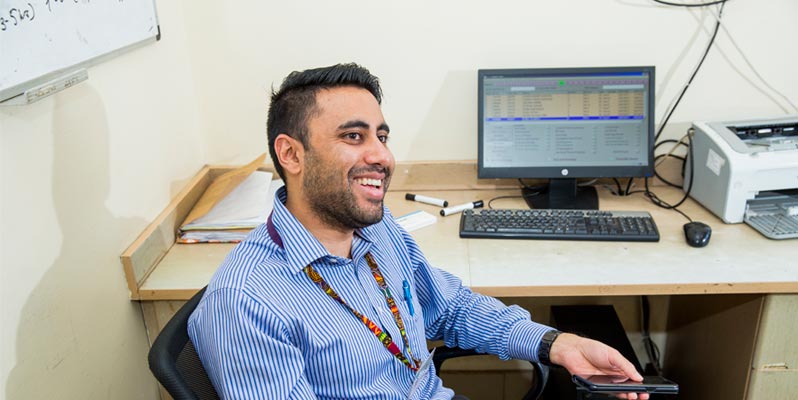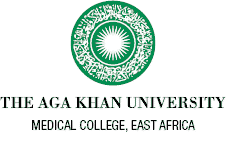Education and Research

Education
Internal Medicine Residency Program
Our Section meets the institution’s educational objectives by:
- Module training for Medicine residents focusing on diagnosis, management, treatment and prevention of cardiovascular diseases.
- Bedside teaching as well as ward round centered around interactive case based learning.
- Supervision of resident dissertation, case reports, abstracts and poster presentations.
- Education of faculty and other providers on evidence based cardiovascular medicine.
Cardiology Fellowship
Our Section is proud to be the first institution in East Africa to introduce a Cardiology Fellowship Training Program in 2017. The Fellowship curriculum has been approved by the Kenya Medical and Dentists Practitioners Board (KMDPB) and offers training in adult cardiology enabling the trainee to master core competencies in the dynamic field of cardiology. The fellowship program is committed to the training of cardiologists who are fully equipped to meet the expectations of a contemporary cardiovascular specialist in the developing world and beyond. The fellowship is also committed to fostering the career goals of the trainees across the broad spectrum of opportunities available within the specialty. Fellows will be able to pursue careers in clinical cardiology and/or as clinician scientists. All fellow must complete a research thesis as part of their training and publish the same in a peer reviewed journal.
Highlights
There are several highlights with respect to the postgraduate medical education programme offered at the Aga Khan University which are readily applicable to the fellowship programme. These include:
Unique, World-Class Facility
The Aga Khan University Heart and Cancer Center has state-of-the-art diagnostic and interventional equipment which greatly assists in addressing patient needs. This unit houses the only cardiac care unit (CCU) in the region, an ICU that are fully equipped.
High Academic Standards
The postgraduate medical education programmes are rigorous with subspecialty preparation examinations for all trainees with written and oral practice examinations
Dedicated and comprehensive educational rounds including:
- Core Curriculum in adult cardiology
- Bedside Physical Examination
- Hemodynamics
- Angiography and Interventional Cardiology
- Advanced Cardiac Imaging
- Electro-cardiograms And Electrophysiology
- Critical Care Unit
- Journal Clubs
- Research Rounds
- Medical education
- Hospital Grand Rounds
Fully developed rotations with experienced attending staff in following areas:
-
Coronary Care And Cardiac Intensive Care Unit, Hemodynamic Monitoring, Mechanical Ventilation And Intra-Aortic Balloon Counterpulsation
-
Consultation Service
-
Inpatient General Cardiology
-
Echocardiography, M-Mode, 2D, Doppler & Color Flow Mapping, Trans-Esophageal Echocardiograms, Contrast Echocardiography & Stress Echocardiography
-
Advanced Cardiac Imaging, Cardiac MRI And CT
-
Exercise Stress Testing And Nuclear Cardiology
-
Electrophysiology, ECGs, Ambulatory Monitoring, Pacemakers And Invasive EP Studies & Ablation on visiting basis
-
Invasive Cardiology, Cardiac Catheterization, Percutaneous Coronary Intervention, Atrial Septal Defect And PFO Percutaneous Closures, Percutaneous Valve Interventions
-
Ambulatory Care, General Cardiology, Adult Congenital Heart Disease, Heart Failure, Electrophysiology (Arrhythmia, ICD And Pacemaker), Pediatric Cardiology, Risk Reduction Clinic
-
Chest Pain Programme, An Emergency Department-based chest pain evaluation programme
-
Pediatric And Adult Congenital Cardiology
-
Research, Broad range of research opportunities from population to basic science
Strong Clinical and Basic Research Programmes
-
Coronary Atherosclerosis
- Valvular Disease
- Cardiomyopathy
- Congenital Heart Disease
- Arrhythmias
- Hypertension
- Pericardial Disease
- Infective Endocarditis
- Pulmonary Heart Disease
- Cardiac Trauma
- Cardiac Tumors and Cardiac Complications of Systemic Disease
- Heart Disease In Pregnancy
- The Heart In Systemic Disease
Hospitals
Fellows will rotate through the various units over three years of training. This is at the Aga Khan University Hospital, Nairobi and the University of Alberta for four months at the end of year 2.
Application Process
Interested fellows apply in writing to the PGME office with two letters of recommendation from supervising physicians. Prior to interview selection, all applicants for the Cardiology Fellowship must meet the following requirements:
- Completion of residency training in internal medicine with M.Med, or core training in internal medicine and completion of all parts of the MRCP (UK) exams or equivalent.
- Must have completed or are in their final year of residency in Medicine.
- Must be a citizen of one of the East African Community countries.
- Must be a registered member of the Kenya Medical Practitioners and Dentists Board or eligible for registration.ACLS certification is desirable.
- A period of focused experience in cardiovascular medicine is considered desirable, but this is not essential.
Remuneration
This is paid position that attracts a gross salary of USD 2,500 per month for all fellows. This includes other medical benefits as enjoyed by staff in the hospital
There is a fellow budget for office space, a computer that must be handed over at end of training and internal training on research methodology and other courses that are deemed appropriate by the faculty.
The fellows are funded for at least one local and international conference per year.
Fees
The application is free.
There is a fee of USD 3,500 per year for trainees. This excludes externally funded trainees
Education and Teaching
- Twice weekly study topics
- Fortnightly journal clubs
- Fortnight PBLs
- Monthly echocardiogram rounds
- Weekly heart team meetings
Areas of Competency Evaluated
All rotations shall have fellows evaluated for progressive competency in the following areas. All must be attained as part of training
- Medical expert
- Communicator
- Collaborator
- Manager
- Health Advocate
- Scholar
- Professional
Fellowship completion
The fellow should meet a minimum of the following to be exit the program successfully
- Achieved overall >90% rotation through the modules
- Fully filled evaluation forms for each rotation shall have at least 90% of all assessments.
- Completed log book as necessary
- Completed research thesis
- Passing a didactic examination offered in the course of training
Requirements
- Completion of an Internal Medicine Residency
- Eligible for registration by the Kenya Medical Practitioners & Dentists Board which must be completed before starting the fellowship
Personal Attributes
- Good communication skills
- Good team player
- Learner who demonstrates good study habits and research skills
- Demonstrates honesty, integrity, compassion and respect for diversity and ethics
- Seeks and accepts advice and adheres to deadlines
To Apply
Applications together with a detailed Curriculum Vitae, names of three referees, telephone number, e-mail address, and copies of certificates and testimonials should be sent by email to mc.ea@aku.edu or post to:
The Director
Postgraduate Medical Education
Faculty of Health Sciences
Aga Khan University
ETB 7th Floor
P.O. Box 30270-00100
Nairobi, Kenya
Research
Current Research Projects
-
The mHealth trial is a Randomised Controlled Trial of Text Message intervention looking at cardiovascular risk factors in patients with Type 2 Diabetes with poorly controlled HbA1c. - Anders Barasa.
-
Cardiac Arrest in Kenya. - Mzee Ngunga.
-
Influenza Vaccination in Patients with Symptomatic Heart Failure. - Mzee Ngunga.
-
The Peripartum Cardiomyopathy Registry under the EURObservational Research Programme under European Society of Cardiology. Country coordinator – Anders Barasa
MMED Theses Research
- Outcomes in patients with acute coronary syndromes in a referral hospital in Sub-Saharan Africa – completed. M. Jeilan, M. Ngunga, and A. Barasa
- Factors associated with mortality in patients with moderate to severe pulmonary hypertension in a tertiary referral hospital in Kenya. M. Jeilan, M. Ngunga and A. Barasa
- Cardiac function in the evaluation of anthracycline cardiotoxicity at a referral hospital in Kenya: A single center study. M. Jeilan, M. Ngunga and A. Barasa
Publications
-
Nichol G, Brown SP, Perkins GD, Kim F, Sterz F, Broeckel Elrod JA, Mentzelopoulos S, Lyon R, Arabi Y, Castren M, Larsen P, Valenzuela T, Graesner JT, Youngquist S, Khunkhlai N, Wang HE, Ondrej F, Sastrias JM, Barasa A, Sayre MR. What changes in outcomes after cardiac arrest is necessary to change practice? Results of an international survey. Resuscitation 2016;107:115-20
-
Stambler BS, Ngunga LM. Atrial fibrillation in Sub-Saharan Africa: epidemiology, unmet needs, and treatment options. Int J Gen Med. 2015;8:231-42.


